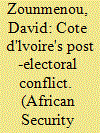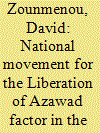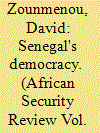| Srl | Item |
| 1 |
ID:
104595


|
|
|
| 2 |
ID:
097674


|
|
|
| 3 |
ID:
097714


|
|
|
|
|
| Publication |
2009.
|
| Summary/Abstract |
The SADC-led mediation in Madagascar has once again come to a standstill. Personal antagonisms have brought to a halt a process that has gone as far as defining and reaching an agreement on the framework of a transition, one that could pave the way for the country's return to democratic order. As concerns are raised over the future of the political dialogue and the likelihood of political violence, it is critical that the mediation refocus to serve as an opportunity for reforms aimed at restoring political legitimacy.
|
|
|
|
|
|
|
|
|
|
|
|
|
|
|
|
| 4 |
ID:
123459


|
|
|
|
|
| Publication |
2013.
|
| Summary/Abstract |
Mali has been a battleground for more than a year now. While the armed conflict came in the aftermath of the Libyan crisis that left the regional security environment depleted, it also served as a catalyst for the collapse of state authority in Mali. This created conditions conducive for the proliferation of, and attacks by, radical religious armed groups in the northern regions of the country, including the Tuareg armed movement: the National Movement for the Liberation of Azawad (MNLA). But, far from being a new phenomenon, the Tuareg-led armed insurrection in the northern regions is as old as the post-colonial Malian state, and continues to pose tremendous challenges in West Africa and the Sahel region for both regional and extra-regional actors. The recent crisis in the Sahel region is seen as one of the most serious since the end of the Cold War, with anticipated dire long-term impacts on the security of the region and beyond. While attention is predominantly focused on defeating the jihadist groups that have threatened the survival of the Malian state, one must not lose sight of the fact that the 'Tuareg Factor', as represented by the rebellion launched by MNLA, remains critical both in terms of appreciating the deterioration of the situation and attempting to frame long-lasting solutions. The paper argues that the Tuareg's persistent recourse to rebellion against Bamako needs to be understood within a historical trajectory that takes into consideration three key parameters: firstly, the post-colonial state in Mali and its African leadership's relations with the descendants of the Tuareg communities; secondly, the amalgamation created by the so-called war on terror; and, finally, the contradictions of the democratisation process of the 1990s.1
|
|
|
|
|
|
|
|
|
|
|
|
|
|
|
|
| 5 |
ID:
103055


|
|
|